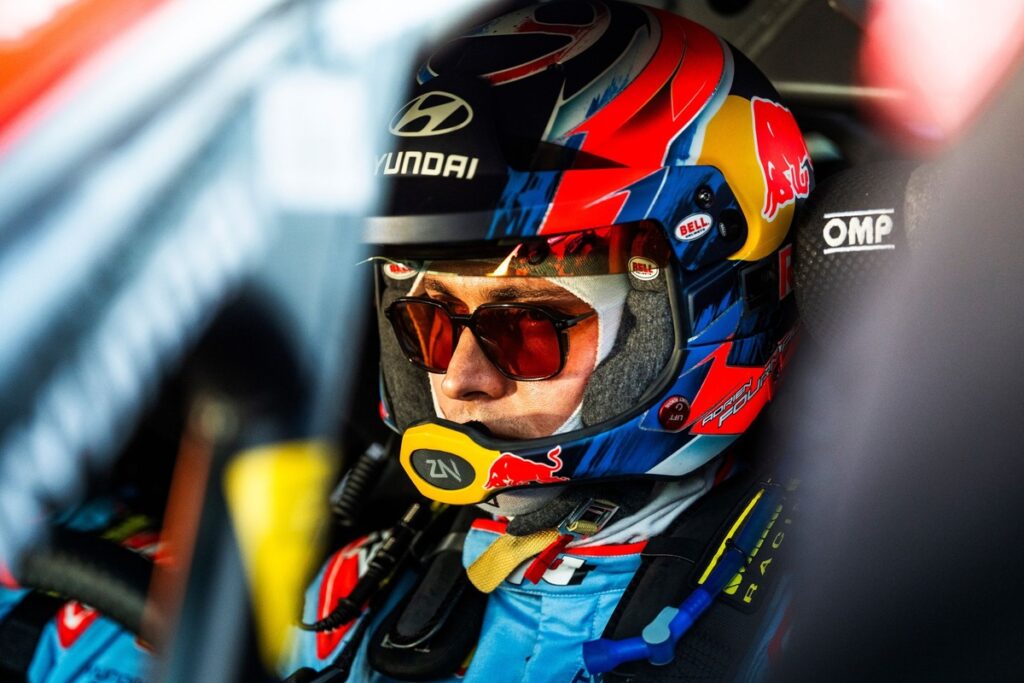For the World Rally Championship drivers and co-drivers to unite in such a way against the FIA’s decision to impose sanction for swearing is an extraordinary move, but also a logical next step.
The ball is now firmly in the FIA’s court after the World Rally Drivers Alliance (WoRDA) issued a lengthy statement strongly opposing the governing body’s move to implement swearing sanctions on drivers, it states for “minor, isolated and unintentional language lapses” – a move it deems “unacceptable”. It is a view that is widely shared by the service park and certainly the fans as the reaction from Adrien Fourmaux’s Rally Sweden sanction highlighted.
This unprecedented reaction from the WRC drivers and co-drivers comes in response to Hyundai’s Fourmaux becoming the first driver to be penalised under the FIA’s clampdown on swearing. The Frenchman received a €10,000 fine, and a suspended €20,000 fine, for swearing during a television interview at the conclusion of Rally Sweden earlier this month.
From the FIA’s point of view it is an understandable aim to clean up the language used by drivers, as they are role models to the next generation. This writer can also understand the logic on clamping down the use of language directed at officials.
In other sports this is punished and has been for some time; in football a player is shown a yellow card for dissent towards an official, while in rugby the captain of the side is the only member of the team allowed to speak to the referee to discuss decisions.
In this age of social media, where it seems online abuse is reaching dangerous levels, action is required. But taking action and the right action are two very different things. A common sense approach is required.
The Fourmaux incident that has seemingly sparked this reaction shouldn’t have warranted a fine. It was a pure reaction from a driver that had just had a microphone and television camera thrust into his face seconds after crossing the finish line of a stage. The scenario Fourmaux was referring to that prompted the F-word did occur the day previously, but again the driver made the comment having just rocketed through a snow-covered road at speed.
Adrien Fourmaux, Alexandre Coria, Hyundai World Rally Team Hyundai i20 N Rally1
Photo by: Red Bull Content Pool
What Fourmaux said wasn’t directed to any official and 99% of the public wouldn’t have deemed the comment as offensive. The phrase was actually directed at himself for making an error of not having his helmet fastened properly that cost him valuable time in a stage. A common sense approach of letting that go makes total sense and also avoids the subsequent uproar that has followed.
It must be said that rallying finds itself in a slightly different situation to other motorsport disciplines. The drivers and co-drivers are subjected to the wildest of conditions in what is arguably the most dangerous of four-wheeled motorsports. And then seconds after a stage ends they are required to conduct an interview when adrenaline is running high. It is these interviews, hugely popular among fans, that are one of rallying’s unique selling points. To equate this to Formula 1, this would be akin to making a driver immediately stop the car after crossing the finish line and then conduct an interview without a cooldown lap to allow the driver to collect their thoughts.
The subject of what happens to the fines the FIA receives through such sanctions has been raised. The FIA is a non-profit organisation and has confirmed to Autosport that the following areas are where its income – including fines – are reinvested. In 2024, the FIA invested over €10.3million into grassroots activities globally, as it delivered 70 motorsport safety research projects with a budget of €3.8m, while €1.3m was invested into the 300,000 volunteers and officials. In addition, 13,500 individual courses were completed via the FIA University last year.
But getting back to the crux of the matter, we are at a point where drivers simply are not sure how to act anymore. It seems ludicrous that we live in a world where F1 has never been so popular, which is largely down to the success of Netflix’s Drive to Survive series that represents a raw, unfiltered version and features plenty of swearing. While it is true it doesn’t come from the FIA, there is a push for drivers to be who they really are in front of the cameras as that has now directly impacts the number of eyeballs on motorsport and particularly the growth of F1.
This success has left other categories desperate to replicate the model. But now the governing body, that seeks to actively grow and promote motorsport, appears to be acting in a way to control personalities. Nobody wants to see drivers acting as robots in interviews and likewise nobody wants to see drivers being totally out of line with their comments. But surely there has to be a compromise.
The actions of the WRC drivers through the WoRDA statement are valid and deserve to receive clarity, and above all the “mutually agreeable and urgent solution” that they merit.
In this article
Be the first to know and subscribe for real-time news email updates on these topics
Subscribe to news alerts
Read the full article here

